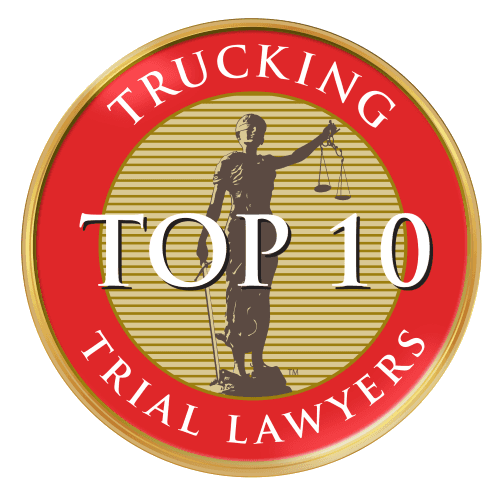
Abilene Truck Accident Attorneys
18-Wheeler & Semi-Truck Accident Claims in West Texas
Texas roadways are filled with 18-wheelers transporting the goods and supplies that keep our economy humming. Most truck drivers are highly skilled professionals who follow traffic laws and industry regulations. But when drivers or carriers break the law to deliver on time or save money, the results can be disastrous.
At Hanna Allen, PLLC, our knowledgeable truck accident lawyers in Abilene will root out evidence of wrongdoing and make sure all negligent parties are held accountable.
If you’ve been injured by a commercial truck, call our Abilene truck accident lawyer at Hanna Allen, PLLC to schedule a free consultation at (325) 440-9996.
Our Team Defends Injured Victims’ Rights
Commercial trucks can weigh up to 80,000 pounds. Passenger cars usually weigh around 4,000 pounds. So, it’s not surprising that when a car is hit by a truck, the occupants of the smaller vehicle are far more likely to suffer injury or death than the truck driver. Severe injuries like spinal cord injuries or brain injuries can occur after devastating truck accidents.
If an accident was caused by negligence, injured vehicle occupants may be owed money to pay for their damages through a lawsuit. If someone was tragically killed in a commercial truck accident, their families may be entitled to compensation. In either event, an 18-wheeler accident lawyer can help.
If you’re a Texan, you know that our roadways are packed with commercial trucks day and night. Oil producers and other industries in the state are highly important to our economy. They wouldn’t be able to operate without the legions of trucks carrying products and supplies. But unfortunately, not all of the drivers operate safely, which puts you and everyone else on the road at risk.
If you’ve been hurt in a truck accident, our Abilene truck accident attorneys can fight for the compensation you’re owed.
To help ensure that your rights are protected after a collision with an 18-wheeler, call our experienced and compassionate commercial truck accident lawyer at Hanna Allen, PLLC. Our Abilene truck accident attorney will be essential to recovering damages for your injuries caused by negligent truck drivers.
Truck Driver Qualifications
Truck driver qualifications involve meeting specific criteria set by regulatory bodies to ensure the safe operation of commercial motor vehicles (CMVs). Here is an overview of the qualifications to become a truck driver in the United States:
- Commercial Driver's License (CDL): To operate a commercial vehicle, drivers must obtain a CDL. There are different classes of CDLs based on the type of vehicle being driven and the cargo being transported.
- Age Requirements: Generally, to obtain a CDL for interstate travel, drivers must be at least 21 years old due to federal regulations. However, some states allow intrastate driving (within state borders) for individuals as young as 18 for certain types of commercial driving.
- Medical Fitness: Drivers must pass a medical examination conducted by a certified medical professional. This exam ensures that the driver is physically and mentally fit to operate a commercial vehicle safely.
- Clean Driving Record: A clean driving record is typically required, meaning minimal or no history of serious traffic violations, DUIs, or accidents. Employers often conduct background checks before hiring drivers.
- Training and Education: Completion of a truck driving school or a formal training program is common. These programs cover vehicle operation, safety regulations, and driving techniques specific to commercial vehicles.
- Knowledge and Skills Test: Passing written and practical tests is mandatory. These tests evaluate the driver's understanding of traffic laws, safety regulations, and their ability to operate a commercial vehicle safely.
- Drug and Alcohol Testing: Drivers are subject to pre-employment, random, post-accident, and reasonable suspicion drug and alcohol testing to ensure a substance-free work environment.
- Endorsements: Some driving positions may require additional endorsements on the CDL, such as for transporting hazardous materials, operating double or triple trailers, or carrying passengers.
- Language Proficiency: Proficiency in English is often required to ensure effective communication with law enforcement, other drivers, and for understanding road signs and instructions.
Federal Trucking Laws
Federal trucking regulations are established by the U.S. Department of Transportation (DOT) and enforced by the Federal Motor Carrier Safety Administration (FMCSA). These regulations aim to ensure safety on the roads by setting standards for commercial motor vehicles (CMVs) and their operators.
Some key provisions include:
- Hours of Service (HOS): HOS regulations dictate the maximum amount of time a commercial driver can spend behind the wheel within specific periods. For instance, drivers typically have an 11-hour driving limit after 10 consecutive hours off-duty, and they must take breaks after a certain number of hours on-duty.
- Licensing and Qualifications: Regulations specify the qualifications and licensing requirements for commercial drivers. This includes obtaining a Commercial Driver's License (CDL) and adhering to medical certification standards.
- Vehicle Maintenance: Regulations mandate regular inspection, maintenance, and repair of commercial vehicles to ensure they are in safe operating condition. This includes requirements for brakes, tires, lights, and other essential components.
- Weight and Size Limits: Regulations set specific limits on the maximum weight and size of commercial vehicles to prevent excessive loads that could compromise safety and damage infrastructure.
- Hazardous Materials Transportation: There are stringent regulations concerning the transportation of hazardous materials, including proper labeling, handling, and specific routes for transport.
- Electronic Logging Devices (ELDs): ELDs are now mandatory for tracking HOS compliance electronically. These devices automatically record driving time to ensure drivers follow HOS regulations accurately.
- Drug and Alcohol Testing: Regulations require commercial drivers to undergo drug and alcohol testing to maintain safety on the roads.
Types of Truck Accidents in Abilene, TX
Truck accidents in Abilene, Texas, can occur in various ways due to a combination of factors involving large commercial vehicles. Some common types of truck accidents:
- Oilfield Truck Accidents: These involve collisions or incidents typically associated with trucks used in the oil and gas industry, often transporting heavy equipment, materials, or personnel to and from drilling sites, posing unique risks and hazards.
- FedEx Truck Accidents: This refers to collisions or incidents involving vehicles operated by FedEx, a global package delivery and courier services company, which can vary in nature from typical traffic accidents to accidents related to package handling and delivery operations.
- Rear-End Collisions: These occur when a truck collides with the vehicle in front of it. They can happen if the truck driver is following too closely or fails to brake in time.
- Jackknife Accidents: In a jackknife accident, the trailer of the truck swings out to the side, forming an angle similar to a partially open jackknife. This often occurs when the truck's wheels lose traction, and it skids.
- Underride Accidents: These accidents happen when a smaller vehicle gets trapped beneath the trailer of a truck. They can result in severe injuries or fatalities for occupants of the smaller vehicle.
- Head-On Collisions: A head-on collision between a truck and another vehicle can be particularly devastating. These accidents often occur when a truck crosses the centerline into oncoming traffic.
- Tire Blowouts: When a truck's tire blows out, it can lead to loss of control, causing the truck to swerve or even overturn. This can result in accidents involving other vehicles.
- Wide Turns: Trucks, especially those with long trailers, require more space to make turns. Accidents can happen when a truck makes a wide turn and collides with nearby vehicles.
- Blind Spot Accidents: Trucks have significant blind spots, particularly on the right side and directly behind them. Accidents can occur when a truck changes lanes or merges without seeing a smaller vehicle in its blind spot.
- Rollover Accidents: Due to their high center of gravity, trucks are susceptible to rollovers when taking curves too fast or when the load is unbalanced.
- Cargo Spills: Improperly secured or loaded cargo can spill onto the road, creating hazards for other vehicles and potentially causing accidents.
- Fatigue-Related Accidents: Fatigued truck drivers may fall asleep at the wheel or have reduced reaction times, increasing the risk of accidents.
- Distracted Driving Accidents: Truck drivers who are distracted by their phones, GPS devices, or other distractions can cause accidents.
- Mechanical Failures: Accidents can occur due to truck mechanical failures such as brake failures, steering problems, or engine malfunctions.
- Weather-Related Accidents: Adverse weather conditions, such as rain, snow, ice, or fog, can make driving more challenging for truck drivers and increase the risk of accidents.
Common Injuries Caused by Truck Accidents
Truck accidents can result in a wide range of injuries, some of which can be severe or even life-threatening. Common injuries caused by truck accidents include:
- Whiplash
- Fractures
- Head & Brain Injuries
- Back & Neck Injuries
- Internal Injuries
- Burns
- Amputations
- Soft Tissue Injuries
- Psychological Trauma
- Fatal Injuries
HOW MUCH WILL YOU GET PAID IF A 18-WHEELER HIT YOU IN TEXAS?
The amount of compensation can vary widely depending on the specific circumstances of the case. In personal injury cases involving accidents with large trucks, such as 18-wheelers, compensation can include medical expenses, property damage, lost wages, pain and suffering, and more. The exact amount of compensation would depend on factors like the severity of injuries, the extent of property damage, insurance coverage, liability, and other legal considerations.
TYPES OF DAMAGES IN A TRUCK ACCIDENT CASE
If you are in an accident caused by a truck driver or trucking company and are injured or suffer other losses, you may be entitled to compensation, also called damages, for those losses. There are two main categories of damages: economic (or “special”) damages and non-economic (or “general”) damages.
Economic Damages Related to a Truck Accident
Economic damages are given for real, quantifiable losses. Since these are expenses with actual price tags attached, they are more straightforward to calculate and less open to interpretation. You may receive economic damages to compensate you for:
- Hospital bills, medication costs, insurance copays, medical devices and equipment, medical transportation (this includes both current and future medical expenses from the accident)
- Costs for rehabilitation and therapy, whether inpatient, outpatient, or at home
- Paid help you require (such as house cleaning or child care) as a consequence of your accident
- Wages you lost due to an inability to work during your recovery
- Lost earning capacity, if you are unable to work at the same level permanently or long-term.
Non-Economic Damages
Non-economic damages are designed to compensate you for pain, trauma, and other less easily quantifiable—but still significant—losses. Since it’s virtually impossible to put a price on pain, non-economic damages are seen as subjective and more difficult to calculate. You may receive non-economic damages related to a truck accident for:
- Pain and suffering, including both emotional and physical forms
- Anxiety and stress stemming from the accident
- Loss of companionship or consortium
- Loss of quality of life.
Punitive Damages
There is another category of damages called punitive damages, also called exemplary damages, that may be awarded. Punitive damages may be awarded if the accident was determined to be the result of someone’s fraud, malice, or gross negligence. In Texas, punitive damages are capped at $200,000 or twice the value of the economic damages, plus the value of the case’s non-economic damages, up to a maximum of $750,000.
Truck accident cases are complex. To ensure that you receive all the damages that you deserve, it’s important to get help from an experienced truck accident lawyer. To speak with our 18-wheeler accident lawyer and learn more about your rights after a collision, call Hanna Allen, PLLC at (325) 440-9996.
TRUSTED TRUCK ACCIDENT LAWYERS IN ABILENE
If you or someone you love has been hurt by a commercial truck, call our trusted Abilene truck accident attorney from Hanna Allen, PLLC. As a local firm with roots in the community, our truck accident lawyers in Abilene have an especially strong commitment to serving our clients. We bring a thorough knowledge of personal injury law and of federal and state laws regulating the commercial trucking industry to each truck accident case. As compassionate attorneys who understand the devastation caused by these accidents, we will always treat you with respect and understanding every step of the way.
To schedule a free consultation with a company truck accident lawyer, call (325) 440-9996. In addition to our Abilene location, we also have conveniently located offices in Midland, Odessa, and Sweetwater.
Call us today to schedule a free consultation with a commercial truck accident lawyer in Abilene, TX. Dial (325) 440-9996 for help.
WHO IS LIABLE FOR A TRUCK ACCIDENT?
Determining liability in a truck accident can involve multiple parties due to the complex nature of commercial trucking operations. Several parties may potentially be held liable:
- Truck Driver: If the driver was negligent, such as through speeding, distracted driving, or violating traffic laws, they can be held responsible for the accident.
- Trucking Company: The company that owns the truck or employs the driver may be held liable if they were negligent in their hiring practices, maintenance of the truck, or if they pressured the driver to violate regulations (such as hours-of-service rules) to meet deadlines.
- Truck Manufacturer or Maintenance Provider: If the accident resulted from a defect in the truck itself or a part (such as faulty brakes or tires), the manufacturer or the party responsible for maintenance may bear liability.
- Cargo Loaders/Shippers: Improperly loaded or secured cargo can cause accidents. If the cargo loading was done negligently by a third-party loading company or the shipper, they might be held liable.
- Government Agencies or Contractors: In some cases, poor road conditions, inadequate signage, or construction zone mismanagement may lead to accidents, holding responsible the government agency or contractor in charge of road maintenance or construction.
- Third Parties: Other drivers, pedestrians, or entities whose actions contributed to the accident could be held partially liable.
WHAT SHOULD I DO AFTER GETTING INTO A TRUCK ACCIDENT?
The moments that follow a truck accident will be devastating, stressful, and chaotic. Your physical and emotional condition might prevent you from taking much, if any, action. However, if you’re able, follow the steps below to ensure your safety and to protect your ability to receive compensation.
- Seek medical attention – You or a bystander should call 911 right away. Even if you have no apparent injuries, it’s important to receive a medical evaluation, which can uncover underlying injuries and provide evidence for your case.
- Contact the police – Calling 911 will likely signal police to come to an accident scene, as well. It’s crucial that police make a report of the accident, as such documentation will be necessary when filing an injury claim.
- Obtain driver information – As abilities permit, it’s best to obtain the truck driver’s license and contact information as well as the truck’s license plate number. Contact information of any witnesses should also be obtained.
- Contact a commercial truck accident lawyer – It won’t be long after an accident before a truck company’s insurance provider will contact you and offer a settlement. At the same time, a trucking company’s lawyers have probably begun building a case to clear their driver from blame. Despite such a difficult situation, you also need to take action fast by contacting an Abilene truck accident attorney. A truck accident lawyer can handle the opposing side’s insurance providers and attorneys while you focus on healing.
Our experienced Abilene truck accident attorney from Hanna Allen, PLLC has the knowledge needed to assess your accident and determine the strength of your case.
HOW AN 18-WHEELER ACCIDENT LAWYER CAN HELP YOU
Hiring an experienced Abilene truck accident attorney can be critical to ensuring that you receive every penny you are entitled to. The legal team at Hanna Allen, PLLC will meticulously review your case and calculate the full value of your losses—including any future accident-related expenses you are likely to encounter. We will negotiate aggressively with the insurance company truck accident lawyer and other parties involved and steadfastly stand up for your interests, whether across the negotiating table or in the courtroom.
Call to arrange a free consultation with our Abilene truck accident attorney from our firm by reaching out to us at (325) 440-9996.
What If My Loved One Is Killed by a Truck?
If you’ve lost a family member in a collision with a commercial truck, you may have a case for a wrongful death claim. While similar in some ways to personal injury lawsuits, wrongful death claims differ. They are designed to compensate survivors of the deceased—generally children, spouses, and parents—for expenses and losses resulting from their family member’s death.
These losses may include:
- Medical bills for care related to the accident
- Funeral and burial costs
- Lost wages and future lost earnings
- Compensation for your emotional pain and suffering
- Loss of love and companionship
- Lost inheritance, which includes funds that the deceased person would have been expected to save and leave to the family after their eventual death.
When you contact our commercial truck accident lawyer in Abilene, we will advise you, based on the evidence and your relationship to the deceased, whether you may be able to bring a wrongful death lawsuit.
How Do Commercial Truck Accidents Differ from Other Car Accidents?
When a collision involves a heavy commercial truck, there is a much higher likelihood of catastrophic injury or death due to the 18-wheeler’s enormous weight. Truck accident cases differ from other types of motor vehicle wrecks legally speaking, too.
When a commercial truck is involved, there are often multiple defendants who may bear some degree of liability. These may include the truck driver, the carrier, the company whose cargo is on the truck, and others. It could even include the driver of another passenger car who cut off the truck, for example, and contributed to the crash. In other cases, manufacturers of truck or trailer parts may also share blame if their parts were defective.
Truck drivers and trucking companies are subject to industry-specific laws and regulations set by the Federal Motor Carrier Safety Administration (FMCSA). Unfortunately, some drivers and trucking companies, under pressure to deliver loads quickly and keep costs down, may not adhere to the letter of the law. When this happens, they can be held accountable for resulting injuries and devastation.
What Are Common Ways Truckers and Carriers Break the Law?
Like all drivers, truck drivers may engage in dangerous behavior. This includes distracted driving, drowsy driving, driving under the influence, speeding, and other common traffic violations. However, with the weight and size of a truck, these dangerous acts can have more catastrophic results. In addition, commercial drivers and their employers have other rules they’re obligated by law to follow, including:
- Hours-of-service maximums– If drivers don’t take required breaks—and accurately record break durations in their logbook—they are breaking the law.
- Vehicle inspection and maintenance – If a trucking company fails to regularly maintain and inspect its vehicles, it is breaking the law.
- Load and cargo rules– It is unlawful for trucks to carry cargo that is overweight or improperly secured.
When an accident occurs, it takes a skilled and thorough truck accident attorney to be able to uncover case details. A commercial truck accident lawyer who’s familiar with the laws and rules that a driver or company might have violated can best look into an accident scenario to uncover causes of negligence.
Our Team Can Help You Get Financial Justice
If you were seriously injured in a crash with a commercial truck, or if you lost a family member in a trucking accident, don’t navigate the legal aftermath alone. To help ensure that you get the full amount of compensation you deserve, look to our experienced truck accident lawyers in Abilene at Hanna Allen, PLLC. We fight hard for clients whose lives have been turned upside down by negligent trucking accidents, including at Texas oilfields.
To speak with our Texas truck accident attorney call (325) 440-9996 or get in touch with us online. In addition to our Abilene location, we have offices in Midland, Sweetwater, and Odessa. Ask about a free consultation with our experts.

Our FAQ
-
Why do I need a commercial truck accident lawyer?When you’ve been in an accident, you may be tempted to quickly accept a settlement from an insurance company without the counsel of a truck accident lawyer. While you might think that speaking directly with the other party’s insurer will save you money by avoiding lawyer’s fees, you will almost certainly be leaving money on the table if you attempt to negotiate on your own. That’s because insurance companies don’t care about offering you a fair amount that will fully account for your losses. Their loyalty is to their shareholders, and they will most likely give you a lowball offer. Once you sign on the dotted line and accept that offer, that is all the money you’ll get for your injuries. And if your injuries were serious, there’s a good chance that the money won’t cover all of your current losses and future expenses. When you work with our Abilene truck accident lawyers, we can carefully investigate all the circumstances of the accident to prove fault. Our 18-wheeler accident lawyer will also review the many ways that an accident has affected your life presently and is expected to going forward to determine a fair value for your claim. Then, our commercial truck accident lawyer will skillfully negotiate with the insurance company to obtain just and comprehensive compensation for your injuries. If the insurer won’t offer an adequate amount, our Abilene truck accident attorney will stand up for your rights by taking the case to trial.
-
How will a truck accident attorney know if I have a case?As with any personal injury case, determining whether you are entitled to damages from another party’s insurance company boils down to liability. Simply put, what matters is who was at fault for the accident. Liability can be determined through police reports, photos, damage to the vehicles involved, documentation, eyewitness statements, expert witnesses and other factors. In some cases, such as a rear-end collision, liability is generally pretty clear cut. A company truck accident lawyer can piece together this evidence to build your case and determine liability.
-
How much does it cost to hire an Abilene truck accident lawyer?At Hanna Allen, PLLC, our truck accident lawyers in Abilene work on contingency. What contingency means is that we get paid only if we obtain compensation for you. We may get you compensation through an insurance settlement or through an award at trial. If we don’t get you any money, we don’t get paid. We also provide free consultations with our Abilene truck accident attorney. If you aren’t sure whether or not you have a case, call us to arrange a free consultation. Once we examine all the facts involved, we’ll advise you as to whether we believe you have a strong case. If you choose to hire our firm, we’ll fight for your rights and interests throughout every step in the legal process.
-
How much is my truck accident case worth?The value of your truck accident case can vary. It isn’t possible to know the exact value of your case without having it reviewed by a truck accident lawyer. A company truck accident lawyer will need to look into the extent of your injuries and other consequences caused by the accident in order to estimate a case value. Accidents that cause more severe injuries and have lasting consequences on a victim’s livelihood tend to result in greater compensation for victims after a successful case is brought.
-
How long does a truck accident case usually take?Every case is different, and there is no definitive timeline that cases follow. Some cases take just weeks or as long as a year or more to reach a settlement. How long an individual case takes depends on all of the circumstances. In general, cases with more serious injuries, more parties involved, and fault that isn’t clear-cut take longer than those that are more straightforward. Cases that reach settlements through negotiations with insurance companies are typically resolved faster. Truck accident cases that end up going to trial take longer because there are more steps in the litigation process, and availability on court calendars can also affect timing. Cases that go to trial can be appealed if one of the parties isn’t happy with the outcome, which further extends the timeframe.
-
How does your 18-wheeler accident lawyer investigate a case?Our experienced company truck accident lawyer will look into multiple forms of evidence and information that can be used to build an accident case. For example, a police report of an accident and information from eyewitnesses and expert witnesses can help determine the exact course of events. Medical records can provide details on injuries and recovery timeframe. Further, information about a truck driver’s and truck company’s history and records can be key. Details obtained from visiting the accident scene and from a truck driver’s logbooks and electronic logging recorders could also be useful to an investigation.
-
How long do I have to file a lawsuit?Texas has a two-year statute of limitations for truck accident claims from the date of the accident or the date that you discovered your injuries. When someone dies in an accident, the deadline for filing suit is two years from the date of death. There are exceptions to these rules, however. If you’ve been injured in a crash or lost a family member, speak directly to our truck accident lawyer about the deadlines that apply to your case.
-
Why should I choose the Hanna Allen, PLLC to represent me?Our truck accident lawyers in Abilene at the Hanna Allen, PLLC put our clients above all else. While our legal team fights for maximum compensation, victims’ futures and concerns are the most important parts of any personal injury case that we handle. Our attorneys and staff value respect and compassion, and we have the results to show that we can successfully help accident victims obtain what they’re owed. We’ve secured multiple multimillion-dollar settlements for victims involved in 18-wheeler motor vehicle accidents. Most importantly, we believe that we’ve helped victims get their lives back on track and be free from financial burdens while they focus on healing and adjusting to changed lives. If you have other questions about your case, our experienced team of truck accident lawyers in Abilene can answer them. Injuries from truck accidents are often severe and can drastically change your life. We understand you need to know about all of your legal options.



The Opinions That Matter Most
Read Our 5-Star Reviews
-
"Professional, compassionate, honest, and extremely knowledgeable!"They assisted my loved one during an unbelievably difficult time, helped provide peace of mind while easing some of the stress.S.
-
"We felt like they really cared and we were part of their family."Highly recommend this law firm! We felt like they really cared and we were part of their family. Jeffery did a thorough job of explaining in terms we could understand.Cie K.
-
"Highly recommend Mr. Hanna and his practice."Mr. Hanna worked long hours, spent countless days preparing for settlements and trials. His compassion for the law and his clients is far better than anything I could have expected or wanted.Justin D.
-
"They go above and beyond and have helped my family."Great people! They go above and beyond and have helped my family and I more times than I can count. Highly recommended!Laura M.
-
"Took really good care of us in a professional manner."Took really good care of us in a professional manner. I’m very pleased with the results and would recommend to anyone.Heaven R.
-
"I’m glad I gave him a call and you will be too!"I had always heard great things about Hanna Allen, and after Meeting Mr. Hanna I too was very pleased with the way he showed me respect and compassion.Shawn F.

.2204181103197.png)


